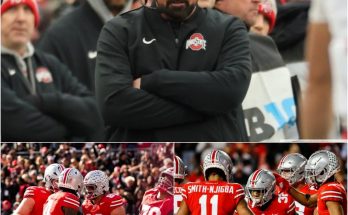In the meticulously calculated universe of college football, where algorithms and committee rooms now crown kings, the Ohio State Buckeyes have once again ascended to the throne of the Associated Press Top 25. They sit at No. 1, a position that feels both familiar and, in the context of the 2024 season, profoundly tenuous. The designation brings with it the usual trappings: the relentless spotlight, the target on their backs, and the inevitable, simmering debate that follows Ryan Day like a shadow. On paper, he is the steward of a modern dynasty, a coach with a staggering .878 winning percentage, multiple College Football Playoff appearances, and a roster perpetually dripping with five-star talent. Yet, the question persists, whispered in Columbus living rooms and shouted across national airwaves: Is Ryan Day, the man at the helm of the nation’s top team, truly the best coach in college football?
The case for Day is built on a foundation of undeniable, almost absurd, numerical dominance. Since taking over full-time in 2019, his teams have been juggernauts of regular-season consistency. He has lost exactly six regular-season games in five-plus seasons. Think about that. In a sport defined by parity, upset alerts, and the sheer emotional volatility of 18-to-22-year-old athletes, Day’s Buckeyes have been a model of ruthless efficiency. He has not just recruited at an elite level; he has industrialized the process, ensuring the Buckeyes’ talent pipeline is not just flowing but flooding. His development of quarterbacks, from Dwayne Haskins to C.J. Stroud, has been exemplary, preparing them not just for Saturday glory but for immediate Sunday success. His offensive schemes, for years, were a symphony of precision and explosiveness, leaving defenses scattered in their wake. By any objective, quantifiable measure, Ryan Day is one of the most successful coaches in the country. He has maintained the standard set by his predecessor, Urban Meyer, and in some statistical areas, he has even surpassed it.
But “best” is a title that transcends statistics. It is a mantle woven from narrative, from the ability to transcend circumstance, and most crucially, from victory in the games that define legacies. And here, in the harsh, unforgiving light of “The Game” and the College Football Playoff, Day’s resume reveals hairline fractures. The specter of Michigan—specifically, Jim Harbaugh—haunts any honest assessment of his coaching prowess. Three consecutive losses to the Wolverines, each more painful than the last, are not just blemishes; they are foundational cracks. In those games, the narrative flipped. Day, the cool offensive guru, was outmaneuvered. His teams, so poised against everyone else, appeared tight, frustrated, and out-physicaled. The “best” coach isn’t just supposed to beat the teams he should; he finds a way to win, or at least be competitive, in the games that are toss-ups, the ones where the pressure is suffocating. For three straight years, in the most important game on the schedule, Day’s Buckeyes came up short.
This is where the comparison to his peers becomes unavoidable and uncomfortable. Is Ryan Day a better football coach than Georgia’s Kirby Smart? Smart built a program from good to immortal, capturing back-to-back national championships by forging a team in the image of a runaway bulldozer. He did so by not only recruiting at an elite level but by developing a culture of such relentless physicality and depth that even an injury-riddled season still sees the Bulldogs in the championship conversation. The same question arises with Nick Saban, the now-retired titan against whom all are measured. Saban’s genius was not just in winning, but in evolving. He changed defensive schemes to counter the spread offense, overhauled his offensive philosophy to keep pace with the times, and maintained a dynasty across multiple distinct eras of college football. Day, for all his regular-season mastery, has yet to demonstrate a similar, season-defining, philosophical counter-punch when his initial plan is stymied.
The argument for Day’s supremacy, then, hinges on a critical pivot point: the 2024 season. This year feels different in Columbus. The air has changed. The painful, soul-searching loss to Missouri in the Cotton Bowl, a game where the Buckeyes looked disinterested and out of sorts, may have been the necessary rock bottom. It seemingly galvanized Day and the program into a state of aggressive, almost desperate, reinvention. The acquisition of quarterback Will Howard from the transfer portal and the stunning, landscape-altering addition of five-star safety Caleb Downs from Alabama were not just roster moves; they were declarations. They signaled a shift from simply relying on developmental talent to aggressively pursuing proven, championship-caliber players from other elite programs. This is a new, more ruthless version of Ryan Day.



